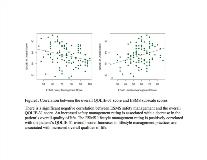Self-Management Practices Associated With the Overall Quality of Life for Adults With Epilepsy
Abstract number :
2.350
Submission category :
11. Behavior/Neuropsychology/Language / 11A. Adult
Year :
2018
Submission ID :
506400
Source :
www.aesnet.org
Presentation date :
12/2/2018 4:04:48 PM
Published date :
Nov 5, 2018, 18:00 PM
Authors :
Robert Quon, Dartmouth College; Samantha Schmidt, Dartmouth-Hitchcock Medical Center; Nicholas Streltzov, Dartmouth-Hitchcock Medical Center; Wenyan Zhao, Dartmouth College; Robert Roth, Dartmouth College; Lindsay Schommer, Dartmouth-Hitchcock Medical Cen
Rationale: Epilepsy self-management is an essential part of patient-oriented medical care that promotes positive health and well-being. Self-management strives to enhance the patients’ competence and confidence. It is assumed that increased self-management leads to an improved quality of life. The objective of this project was to quantify which components of the Epilepsy Self-Management Scale (ESMS) are most pertinent for predicting an improved Quality of Life in Epilepsy (QOLIE-31). Methods: The data was obtained from baseline questionnaires of the pragmatic replication trial of HOBSCOTCH, a self-management program for cognitive problems, conducted in four New England epilepsy centers prior to the intervention. Subjects were adults (n = 100) with epilepsy and subjective memory complaints. Correlations between the baseline ESMS scores and QOLIE-31 scores were assessed for both the overall scores and the subscale scores of each questionnaire. Linear models were employed on normalized data to quantify these observed relationships. Results: There was no correlation between overall self-management scores and quality of life scores. The subscale analysis indicated that certain ESMS subscale scores were strongly correlated with the overall QOLIE-31 score. Improved ESMS medication management (p = 0.02) and ESMS lifestyle management (p = 0.0004) were associated with an increased quality of life score. In contrast, enhanced ESMS safety management behaviors were associated with a decreased overall quality of life score (p = 0.003). The relationship between safety management (adjusted p = 0.002) and lifestyle management (adjusted p = 0.002) remained statistically significant after adjustment for age, gender, and relationship status. A model including Patient Health Questionnaire-9 (PHQ-9) scores indicated that safety management alone remained significant (p = 0.0003). Conclusions: Safety management and lifestyle management measures demonstrated a robust relationship with the overall quality of life. Adjustment for depression revealed that only safety management retained an inverse relationship with the overall quality of life. These findings confirm that quality of life is greatly dependent on depressive symptoms and underscores the importance of treating depression in epilepsy. In addition, an overemphasis of safety behaviors may negatively affect quality of life. Future prospective studies evaluating the efficacy of interventions that emphasize the most salient self-management methods are warranted. Funding: This research is funded by the Centers for Disease Control and Prevention (CDC) and is supported by special interest project SIP 14-006, Cooperative Agreement Number: 1U48DP005018.
